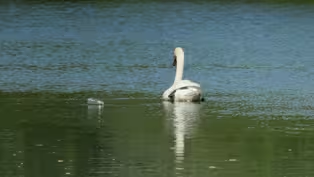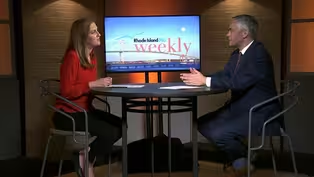
President Calabro
Clip: Season 5 Episode 44 | 10m 5sVideo has Closed Captions
Maribeth Calabro, a longtime Providence teacher, now leads RI’s largest teachers union.
Maribeth Calabro, a longtime Providence special educator, was elected last week as president of the RI Federal of Teachers and Health Professionals, the largest teachers union in the state. Calabro sat down with Steph Machado to talk about her top priorities and reflect upon 30 years in Providence.
Problems playing video? | Closed Captioning Feedback
Problems playing video? | Closed Captioning Feedback
Rhode Island PBS Weekly is a local public television program presented by Ocean State Media

President Calabro
Clip: Season 5 Episode 44 | 10m 5sVideo has Closed Captions
Maribeth Calabro, a longtime Providence special educator, was elected last week as president of the RI Federal of Teachers and Health Professionals, the largest teachers union in the state. Calabro sat down with Steph Machado to talk about her top priorities and reflect upon 30 years in Providence.
Problems playing video? | Closed Captioning Feedback
How to Watch Rhode Island PBS Weekly
Rhode Island PBS Weekly is available to stream on pbs.org and the free PBS App, available on iPhone, Apple TV, Android TV, Android smartphones, Amazon Fire TV, Amazon Fire Tablet, Roku, Samsung Smart TV, and Vizio.
Providing Support for PBS.org
Learn Moreabout PBS online sponsorshipCalabro's top priority as the new leader of the Rhode Island Federation of Teachers are improvements to the teacher retirement system and pushing to limit the number of seats at charter schools, which unions have long criticized for pulling resources from traditional public schools.
- It does not cost the same amount of money to teach all children, so we get a per-pupil expenditure that follows the child.
But those students who do not hit the lottery and get to go to the charter schools who have differing abilities, who are multi-language learners, require a lot more services, a lot more supports that are expensive.
- You just had a charter school though, the Paul Cuffee School- - Correct.
- the teachers have voted to join the AFT?
- Correct.
- Will that change anything about your criticism of charters if they're now union members?
- So if you look back, my criticisms have been of charters, but I specifically call out big-box charters or education factories as I like to refer to them.
I have always been supportive of niche charter schools.
- Teachers union often have a really influential voice in elections.
The AFT in the last governor's race split with the other teachers union, the NEA, and endorsed Nellie Gorbea over Dan McKee.
What is your take on how Dan McKee is doing as governor when it comes to education?
- I don't think he's doing well.
I don't think he's doing right by the students and families of our city or our state.
I think that he doesn't understand what the needs of individual schools are, but particularly urban schools.
And I think that he's put all of his eggs in the basket of the 365 that he talks about and he's promoting, and the afterschool programs and stuff, which are all fantastic, but we need support day in and day out from morning till early evening for our students.
- Right now, his main challenger appears to be Helena Foulkes.
Do you have any thoughts on her?
- I think that she is not nuanced enough in talking about assessments, but I do think that she has some really good ideas, really solid ideas about education in Providence, urbans, and particularly the state at large.
- [Steph] The new scores on the statewide assessment called the RICAS released in October showed only 3 in 10 elementary and middle school students statewide are reading or doing math at grade level.
Massachusetts' scores on the MCATs dropped this year too.
Though Massachusetts students are still roughly 10 percentage points above Rhode Island in both English language arts and math.
- I have very strong feelings about RICAS and assessments, but it's one moment in time, it's a snapshot, and I don't think it tells us everything that we need to know about our individual students.
I'm not one to blame COVID for everything, but we are teaching different children right now.
The children that were impacted by COVID are not the same children that we used to teach.
The level and degree of social-emotional issues that they're having, loneliness, depression, anxiety, acting out, behavioral needs, is nothing like we've ever seen before and not just in Providence, it's across the state.
- So you don't seem to hold a lot of stock in the RICAS scores.
- That test doesn't measure other things.
It doesn't measure creativity, it doesn't measure artistic ability, it doesn't measure musical ability.
It literally measures what it's intended to measure, which is the curriculum products that we're using.
And so we have to think about if our students aren't making gains the way that people expect them to, then maybe we should take a deeper, harder look at what the curriculum is that we're using.
- You are leaving your job as a special educator at Nathanael Greene Middle School where you've been for 30 years.
Could you reflect for me on how the district has changed from when you started to now?
- Oh yeah.
Well, a lot.
It's changed a lot and it's changed a lot of different times, right?
So when I started in 1993, we had just embarked on looking at standards, and over the years we've gone through different edifications of curriculum products.
We've been through, I can't tell you how many superintendents I've been through, but it's been a few.
I say this all the time and I will say it probably till the day I die: Providence teachers are some of the best teachers in the country.
And regardless of whether or not the test scores show that, when you see kids coming in every day running up to their teacher, hugging them, and having relationships with families, and being invited to quinces and going to baseball games and developing these interpersonal relationships to support our students, to me, that speaks volumes to the character and the dedication of our teachers.
And I've seen some really amazing teachers get burnt out recently, partially due to the takeover and partially due to the effects of COVID, if you will.
I tell the new teachers in my building, "I'm older than the furniture (Steph chuckles) and I've been here a lot longer than the furniture."
I've seen a lot.
I've seen a lot.
- Demographic shifts too, right?
I mean in the- - Yeah.
Absolutely.
Absolutely.
- needs of the kids more.
- The needs have changed a great deal.
The demographics have changed.
We are seeing a lot more multi-language learners than we've ever seen before.
And not just Spanish speakers, right?
We're seeing people who are from Cambodia, from Vietnam, from Afghanistan.
So, you know, we have to again, pivot.
- So for the past five years, and you've been Providence Teachers Union president for all that time, the district has been under state takeover, which you've been highly critical of.
Are the Providence schools better or worse today than they were five years ago?
- They're different.
Are they better?
I would say in some instances, maybe.
I think that we are better at identifying the social-emotional needs of our students.
I believe that teachers are trying to be more engaged with the parents and the families to which they serve.
I think that there have been some good changes.
I think that Dr. Montañez being made superintendent was a good change.
I think that some of the things that are not great are the amount of folks that we've lost.
- You mean teachers leaving the district?
- Teachers leaving, principals leaving, you know, upper admin staff.
I think that that's a problem.
- [Steph] The Providence Public School District is in the midst of a financial crisis with officials warning the school system could run out of cash this winter without an infusion of nearly $11 million.
The list of cuts on the table includes eliminating all sports and cutting transportation for high schoolers who live less than two miles away from school.
What do you make of this position that the district is in right now?
- We're in trouble.
We're in big trouble.
And whenever the powers that be get to this point where we're in court and we're arguing and we're pointing fingers and we're doing all those things.
In our situation, the people who are suffering are gonna be our students.
Sports is on the table.
Sports is what brings them to school on a regular basis.
Sports is what keeps them focused in class so that they can get the grades that they need to get in order to stay on the team.
Plus, it's an outlet for them, so they're not, you know, doing nothing and on the phones and with they're on social media.
That's a big deal.
Cutting staff, we're at bare bones as it is.
And so this is literally a fiscal DEFCON 1.
- You think the city should put more money in, do you think the state should put more money in?
- They need to be grownups.
Come to the table and say, "I'll give you 10 million if the state kicks in 10 million."
"I'll give you 7 million if the state kicks in 7 million."
And then going forward after that, if they want to check receipts, they want checks and balances, fine, but we can't go backwards.
The money's gone.
It's already been spent.
So can we stop pointing fingers and name calling And "he said, she said," "they did, I didn't," "I paid, she didn't pay."
I don't care and I don't think our kids care either.
Pay up and we'll figure it out later.
Video has Closed Captions
Clip: S5 Ep44 | 11m 21s | Reducing stormwater runoff in Mashapaug Pond. (11m 21s)
Video has Closed Captions
Clip: S5 Ep44 | 4m | A report finds Governor Dan McKee intervened to steer a large contract to ILO. (4m)
Providing Support for PBS.org
Learn Moreabout PBS online sponsorship
- News and Public Affairs

Top journalists deliver compelling original analysis of the hour's headlines.

- News and Public Affairs

FRONTLINE is investigative journalism that questions, explains and changes our world.












Support for PBS provided by:
Rhode Island PBS Weekly is a local public television program presented by Ocean State Media

